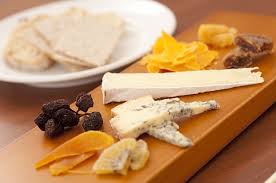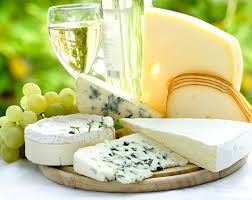Introduction
There’s nothing like opening a nice bottle of wine, and at the same time enjoying a delicious cheese platter. Everyone knows that cheese and wine go very well together. Yet it is not always easy to find the right cheese with a particular  wine, or vice versa. There are as many cheeses as there are days in a year, which makes a right combination all the more difficult. Both cheese and wine have their own unique and characteristic tastes and textures and therefore, it makes the combination of different cheeses with only one wine a difficult if not an illogical one.
wine, or vice versa. There are as many cheeses as there are days in a year, which makes a right combination all the more difficult. Both cheese and wine have their own unique and characteristic tastes and textures and therefore, it makes the combination of different cheeses with only one wine a difficult if not an illogical one.
We all have encountered it at some time or another. You are invited to a party or some other venue and you are presented with a wine and a cheese platter with four or five completely different cheeses, ranging in taste from soft to pleasant (mostly in young cheeses) to the salty and hearty ones ( the older cheeses). With the same wine, some combinations might work, however, you are bound to experience combinations that absolutely do not work. Spend a little time with me here and I will explain why this is. Moreover I will recommend some of the more logical wine cheese pairings.
Cheeses
Young fresh cheeses have high water content and a milky, delicate texture. If cheese gets older the moisture  evaporates slowly. Fat and protein ensure the flavours are retained. Older cheeses are therefore spicier and heartier. Cheeses like Brie continue to develop and have an earthy flavour. Older cheeses like Gruyère and Emmental, get a nutty flavour. Blue cheeses develop a strong focus by the fungus cultures that make them so tasty.
evaporates slowly. Fat and protein ensure the flavours are retained. Older cheeses are therefore spicier and heartier. Cheeses like Brie continue to develop and have an earthy flavour. Older cheeses like Gruyère and Emmental, get a nutty flavour. Blue cheeses develop a strong focus by the fungus cultures that make them so tasty.
Red wine and cheese
Contrary to common belief red wines are more difficult to combine with cheese than white wines. A combination of a cheese with a very distinct and strong taste and a red wine is far from being evident. One of the most important factors is that red wines contain tannins that influence colour and taste. The saltiness of the cheese will then accentuate the bitterness of the tannins and the salt in the cheese will soften the  fruitiness in the wine. The salt can, however, accentuate the sweetness of a wine!
fruitiness in the wine. The salt can, however, accentuate the sweetness of a wine!
If your preference is for red wine, it is best to choose varieties with less tannins (such as Beaujolais, Pinot Noir, Gamay and Grenache) and for wines that were not raised in new oak. Oak also contains tannins, so an oaked wine will have tannin. But please remember that red wine from warmer regions (e.g. Australian Shiraz) usually fairs better with cheese because they contain a lot of fruit and tannins are very ripe, thus less bitter.
White wine and cheese
In general we can say that white wine goes better with a cheese platter than red wine. White wines contain no tannins, simply because the grape skin, which contains tannins, is not used during fermentation. In a white wine we discover aromas that can also be found in cheeses such as hazelnut, white fruits and butter.
Furthermore, white wine is usually the better choice in the case of goat cheeses (e.g. sauvignon blanc) and hard  spicy cheese from cow’s milk. The lush Chardonnays from the New World (Australia, California, Chile) often show their best side with any cheese platter.
spicy cheese from cow’s milk. The lush Chardonnays from the New World (Australia, California, Chile) often show their best side with any cheese platter.
Dry white wines fit perfectly with soft cheeses, ripened cheeses and fresh goat cheese. Sweet white wines and full Chardonnays fit perfectly with the more strong cheeses, and more sophisticated types of cheese. They of course also fit well with blue cheese.
I did meanwhile write a more extensive article on pairing Chardonnay with cheese, which you will find here.
I have further detailed the pairing of Chardonnay to the right foods here.
Other useful tips
As always, the right combination of wine and cheese is often just a matter of your personal taste. Some combinations simply work better than others. When choosing a wine please consider these useful hints:
- Any type of cheese in principle requires its own type of wine
- Wines and cheeses from the same region usually fit well together.
- Herbal cheeses rather need a fresh white wine than a solid wine.
- Wines with pronounced tannins are not easy to combine with cheese.
- An overdose of wood (containing tannins) in the wine does not fit well with cheese.
- Very salty cheeses do not match with red wine
- If in doubt, choose a white wine.
A favourite combination of mine is having blue cheese with a full bodied Chardonnay from the New World region. The wine becomes perfectly sweet!
If this article has whetted your appetite for wine, then find some wine reviews of excellent Chardonnays from the best areas in the world. In order to gain access just click on one of the three (markets for USA, UK or Australia) pictures to the right hand side (for mobile users just under this text) .
What are your experiences with wine and cheese matchings? What is your favourite matching? Please chime in with a comment.

Hi Jerry
Fantastic post! Very informative and really helpful. I will bookmark it for future reference.
Thanks Emily, I am really grateful for that and if you know of wine lovers in your network, please give them the link. I am going to do the same with yours. Cheers, Jerry.